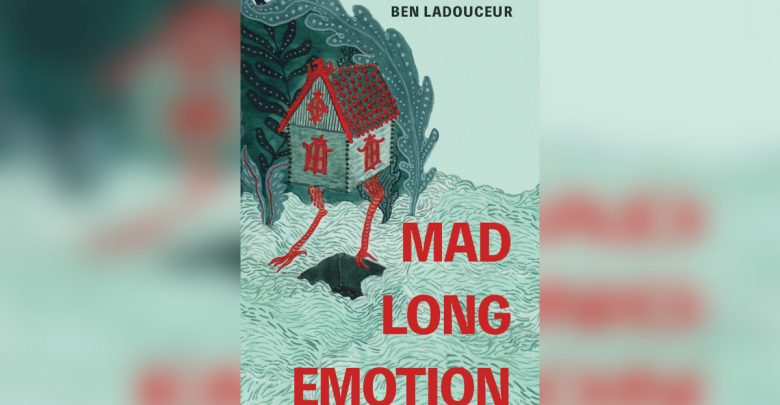Book Review: Mad Long Emotion
 Supplied
SuppliedQueer tenderness is the impetus of Ben Ladouceur’s sophomore poetry collection, Mad Long Emotion (Coach House Books, 2019).
Opening with a love letter to his readers, “Property of ___________,” Ladouceur, at a reading at Latitude 53 on July 10, said, “if you buy the book, I’ll write your name there.” In this poem, he metaphorically calls his book a gift, but, like all gifts, “really it’s for me.” This poem, raw and almost startlingly intimate, calls attention to the communion Ladouceur creates between himself and those who read his work, an act of exchange and love over words and stories.
Ladouceur breathes new life into old forms, beginning Mad Long Emotion with a series of accomplished sonnets that stretch the traditional rhyme schemes and rhythmic conventions of the poetic form. While sonnets, a form of poetry originating in the Early Modern period with Shakespeare and Petrarch (who both lived from the 1400s to 1500s), have many iterations, they follow standard rules of rhyme and rhythm which Ladouceur stretches and even, at times, skillfully breaks. The sonnets constrict Ladouceur’s intensely emotional language. With each line, he offers a sentence, each brief and unadorned. Yet his simple language is often incredibly effective, as he writes of Leonard Cohen’s death, a bear cub found in Ottawa’s Byward Market, and spring.
His first collection, Otter, was nominated for a LAMBDA Award, and while not every poem in Mad Long Emotion deals explicitly with queer love, Ladouceur’s work is precisely and deeply queer-informed. In “The Green Carnation,” he muses over ever-changing fashions and the Victorian accessory that indicated homosexual desire. In the present-day, a friend’s copper spray-tan serves the same effect. Referencing Pokemon Go, Ladouceur’s poems are painfully present, but also timeless. He approaches the world with a poet’s eye and a wonder that seems almost childlike, but never childish.
Ladouceur turns his eye to nature, reminiscent of the Romantic and Victorian poets, writing about green lampreys, loosestrife, and triceratops. But his poems, often funny, tongue-in-cheek odes to the absurdity of everyday living, resist simple adoration of the natural world. Instead, he uses it to ask questions. Why are we here? How do we grow? What does it mean to have a home?
A book easily devoured in one sitting, Mad Long Emotion offers depths that will pull any fan of poetry back to its pages time and time again. Ladouceur turns all things beautiful: the comic, the tragic, and everything in between. In “Colostomy,” the abject — the shit that our incontinent bodies can’t help but expel — are as intimate and tender as the emotions we can’t hold private in our hearts any longer. Disciplined and accomplished, this collection is also accessible, a step into Ladouceur’s queer, poetic world of beauty that I, at least, couldn’t resist.




